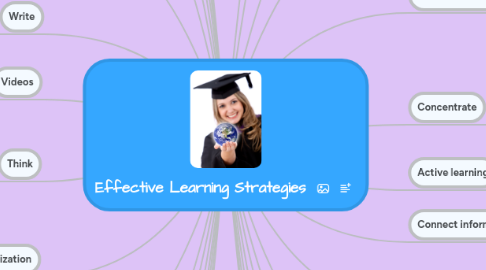Effective Learning Strategies
da Galib Ali


1. Restudying material after initial reading
2. Improve performance
3. Feelings
4. Teach
4.1. You colleagues
4.2. Other students
5. Simulate
5.1. Procedural knowledge (process)
5.2. Practice with new problems
6. Logical
6.1. Sound reasoning
6.2. Part makes sense in the whole
7. Visualize
7.1. Pictures, colors, cartoons
7.2. Diagrams, charts, graphs
7.3. Bizzare visualizations/associations
8. Practice testing
8.1. Self-testing
8.2. Practice tests
8.3. Practice recall
8.4. Helps with future retrieval
9. Write
9.1. Write down what you've learned
9.2. Writing challenges you to organize your thoughts
10. Videos
10.1. Supplement reading materials with videos
11. Think
11.1. While learning
11.2. About what you're learning
11.3. About how you're learning
12. Summarization
12.1. Condense text
12.2. Capture important ideas
13. Subconscious
13.1. Sleep on it
13.2. Revisit later
13.3. Thinking "to go"
14. Self-explanation
14.1. Explaining steps taken during problem solving
14.2. Declarative knowledge (facts)
15. Rereading
16. Reflect
16.1. Process information in your own way
16.2. What you know about what you know
16.3. How you learn
17. Paraphrase
17.1. Your own words
18. Organize
18.1. Structure information
18.2. Arrange and rearrange
19. Keyword mnemonic
19.1. Keywords
19.2. Mental imagery
20. Meaningful
20.1. Does it make sense to you?
20.2. Learn from general to specific
20.2.1. Start with outline
20.2.2. Add details
21. Explaining how new information is related to known information
22. Deliberate practice
22.1. Quality + Quantity
22.2. Highly structured
22.3. Requires
22.3.1. Focus
22.3.2. Effort
22.3.3. Time
22.4. Process
22.4.1. Immediate informative feedback on performance
22.4.2. Build on existing knowledge
22.4.3. Repeat until mastered
22.4.3.1. Not inherently enjoyable
22.4.4. Motivated to improve performance
